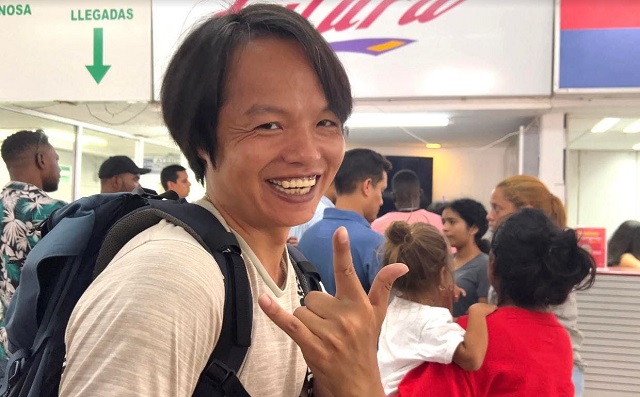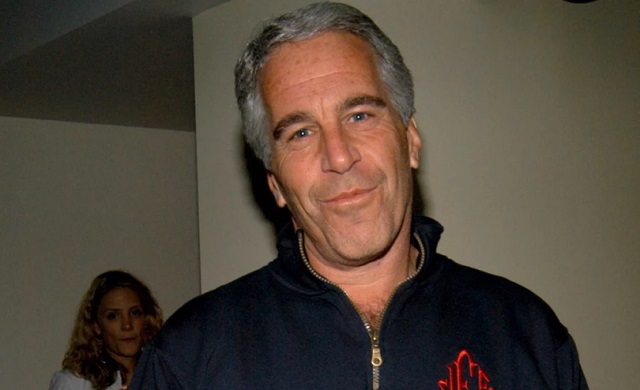espionage
China Likely Exploiting Biden’s lax border policies — imperiling US security

A young Chinese national man moving through Reynosa, Mexico in this May 2023 photo by Todd Bensman
By Todd Bensman as published February 26, 2024 by The New York Post
AUSTIN, Texas — In the Trump administration’s final three years, a dedicated FBI effort, the China Initiative, nabbed dozens of Chinese Communist Party spies who, posing as scholars, relieved top American research institutions and their naïve professors of sensitive and prized national-defense research.
Those spies had flown into American airports — hiding their military service and Chinese diplomatic relationships — quite legally on cultural-exchange and student-visa programs.
But in a series of stunning make-up presents to China for Donald Trump’s crackdown, his successor President Biden in July 2021 summarily killed a ready-to-go Trump regulation that would have required much more rigorous and frequent vetting of Chinese student and cultural-exchange visa applicants.
That same month, the Department of Justice dropped strong charges against five visiting researcher spies as a diplomatic sop amidst the new administration’s outreach.
Team Biden ended the China Initiative itself in 2022 on grounds the spy-hunting program — especially its name — contributed to bias against US-based Chinese immigrants.
If the Chinese spy services weren’t utterly thrilled with these generous offerings, the Biden government has now outdone itself.
|
|
His Department of Homeland Security has let in at least 44,000 Chinese nationals who illegally crossed the southwest border from the time he took office through January 2024, most of them flying first into Ecuador on cheap tourist visas available for a few bucks online.
More Chinese nationals are crossing the San Diego border than Mexican nationals.
While there’s no evidence to support theories China is sending troops in civilian clothing to await Beijing’s attack orders, it’s virtually certain some of these young men and women are at least spies.
SEE ALSO BENSMAN’S: Joe Biden Just Condemned America to More Chinese Espionage – and Worse
And we have a good idea of what they want to do this year, based on China’s relentless past espionage campaigns against the United States and our intelligence community’s determinations.
There are the usual missions we know quite well from Trump-era prosecutions.
China “will likely continue” to “employ economic espionage” and “seek to illicitly acquire our technologies and intellectual property,” concludes DHS’s own 2024 Homeland Threat Assessment.
But the report adds lesser-known layers.
Chinese operatives will work hard online all year to undermine November’s elections, sow political division and erode faith in the country’s institutions and democracy, using AI-driven social-media campaigns.
Besides exfiltrating our technology and running influence campaigns during 2024 and beyond, China will employ operatives to target, find and “repress” anti-regime opponents living and speaking out in America.
Those operatives will use “physical assault, threats, harassment and defamation, rendition” — kidnapping out of the country — “to suppress oppositional voices,” the threat assessment says.
China will be the most aggressive actor in that kind of activity, the assessment declares, adding this surprising tidbit without much elaboration: “Beijing has used a small number of secret, unsanctioned ‘police stations’ in the United States to identify, monitor, and harass dissidents. Its global ‘Operation Fox Hunt’ has sought the extradition of Chinese dissidents under false legal pretenses” so they can be kidnapped and dealt with.
What better way to staff those secret police stations and accomplish its other missions than by moving all the operatives necessary into America over its wide-open southern border?
There is no less risky way in.
China is sending them in because, like the millions of other nationalities coming in from all over the world, its apparatchiks well know Biden’s Border Patrol will quickly process almost all of them into the country on their own recognizance to later claim asylum and sink roots into American society for years with almost no questioning or vetting at the border to discern past service in China’s military and intelligence services.
For Chinese spies and government operatives, border crossings offer far less chance of detection than do student-visa-application processes, which take place in a US consulate or embassy in China and supposedly require face-to-face interviews and intelligence-database searches.
In April, the Biden DHS drastically reduced the number of interview questions Border Patrol agents have to ask Chinese illegal immigrants, from 40 to just five.
Why eliminate even this thin membrane of border vetting?
To avoid large backups of humanity at the border that news video drones can capture and speed up flows to US interior cities.
Many are no doubt regular economic immigrants hoping to live in America, land of the free.
But China would be stupid not to put spies into this almost-unregulated flow, and the spymasters are not stupid.
They are patient, willing to invest in long-term outcomes in lengths of time that certainly match five-year asylum-claim backlogs.
The many Chinese immigrants I have met on the trail in Mexico are among the best equipped, best dressed, most thoroughly coached on what to say and knowledgeable about trail travel.
Some are quite well educated.
Their spies are certainly trained well enough to get through five questions at the border.
Then, as time passes, they will no doubt enroll in top universities, nab gigs at top research institutions, join the US military posing as anti-Communists and enter federal-government service.
It may take a long time for US counterintelligence to discover the ones who came in over the border.
By then, because of Team Biden’s extreme national-security mismanagement, the damage will already have been done.
Todd Bensman is a senior national-security fellow at the Center for Immigration Studies.
espionage
Soros family has been working with State Department for 50 years, WikiLeaks shows

From LifeSiteNews
Files from State Department officials as early as the 1970s show the US government helping the family of radical leftist financier George Soros secure deals and funding.
The U.S. State Department has been working with the Soros family for at least 50 years, Mike Benz demonstrated using diplomatic cables published to Wikileaks.
Benz, a former deputy assistant secretary at the U.S. State Department, explained in a video posted to X on Sunday that he searched for the terms “Soros” and “Open Society Foundation,” which was created by Soros, in Wikileaks’ collection of diplomatic cables. His goal was to “create a comprehensive tapestry of all U.S. state department involvement with Soros and the Open Society Foundation in every country in the world.”
The former state department official, now the executive director of the Foundation for Freedom Online, wanted to document why it was said that George Soros is treated by the U.S. like an “independent entity” akin to a country.
In a 1995 piece published by The New Yorker, former U.S. Ambassador to Turkey Morton Abramowitz said of Soros, “he’s the only man in the US who has his own foreign policy — and can implement it.”
Strobe Tallbott, former deputy secretary of state, also said of the far-left financier, “It’s like working with a friendly, allied, independent entity, if not a government. We try to synchronize our approach to the former Communist countries with Germany, France, Great Britain — and with George Soros.” This he “added with a grin,” wrote Connie Bruck.
Benz reviewed key cables from State Department officials as far back as the 1970s demonstrating the U.S. government’s involvement with the Soros family in what appeared to be a quid pro quo relationship.
In one 1976 cable from former U.S. Secretary of State Henry Kissinger, it was shown that the Brown & Root (now Halliburton), a CIA-linked company known for work on military installations and off-shore drilling platforms, wanted to “go all out” for the construction of a port in Santa Clara, Gabon, a country on the west coast of Africa.
It is noteworthy that Brown & Root’s co-founder Herman Brown was granted a covert security clearance for work with the CIA in 1953 “for use as a covert associate.” As of the 2000s, the company was one of George Soros’ top five holdings, Benz showed.
Referencing Brown & Root’s Manager of International Sales, Kissinger wrote, “O’Sullivan has just come from detailed discussions with Soros Associates to develop background for on-site estimates of construction timetable and costs … to be used in forthcoming talks with Gabon officials.”
Soros Associates, Benz explained, was run by George Soros’ older brother Paul Soros, now deceased.
The cable, addressed to the U.S. Embassy in Gabon, seemed to pressure assistance for the construction of this port, noting that while the request for help with it came at a “difficult time,” “strong interest” in the project and other reasons “preclud[ed] deferral.”
Another series of messages show that the U.S. Department helped the Soros family to secure a contract for the port in Gabon.
According to one cable, the director of the Santa Clara port, named as “Damas,” “said that meetings had been held within the Government of Gabon and were continuing which should lead shortly to the elimination of all but a few offers and that Soros was in a very good position.”
Benz remarked, “Here is the head of the State Department in Gabon backchanneling with the head of the port to make sure that Paul Soros won the bid. Eliminate all of the opposition.”
Another message read, “It appears Soros Associates virtually certain to get engineering contract for Port.”
“Not only is the US State Department negotiating Soros’ deals, helping him secure the deals. They’re also backchanneling so that foreign governments can pay [S]oros so that Soros makes his appropriate profit on the deal,” remarked Benz.
“There is this favors-for-favors relationship that goes back five decades, And those are just the earliest cables we have,” he added.
The exposure of these cables has been described as an “ultra massive find” by journalist Alex Jones.
The find is massive because George Soros himself, as was admitted by Morton Abramowitz and Strobe Tallbott, has foreign policy interests independent of the U.S. and over the past decades has demonstrated influence on U.S. domestic policy in favor of an impotent justice system, internet censorship, and a wide range of left-wing causes such as abortion, euthanasia, and population control, as well as homosexual “marriage,” and transgenderism. In other words, as some commentators have put it, his impact has been to erode the moral fabric of America and weaken the country.
espionage
Trump: “I HAVE JUST SIGNED THE BILL TO RELEASE THE EPSTEIN FILES!”

President Trump moved Wednesday to end years of secrecy surrounding one of the nation’s most notorious scandals, signing legislation that compels the Department of Justice to hand Congress virtually every scrap of material tied to Jeffrey Epstein. The president announced the move on Truth Social, writing, “I HAVE JUST SIGNED THE BILL TO RELEASE THE EPSTEIN FILES!”
Trump reminded supporters that he personally pressed House Speaker Mike Johnson and Senate Majority Leader John Thune to fast-track the legislation. “Because of this request, the votes were almost unanimous in favor of passage,” he wrote, pointing to the rare level of bipartisan agreement behind a bill that forces unprecedented transparency. The Epstein Files Transparency Act requires the DOJ to deliver all unclassified records — and as much classified material as possible — to Congress within 30 days. It also directs Attorney General Pam Bondi to provide lawmakers with a list of government officials and other “politically exposed persons” tied to Epstein within just 15 days.
The measure sailed through the House in a staggering 427–1 vote Tuesday before clearing the Senate unanimously. Its path to passage wasn’t always straightforward. For months, the Trump administration had sparred with lawmakers pushing for the release, with the president often calling the frenzy around “Epstein files” a Democrat-driven hoax designed to smear him.
In his Truth Social post, Trump leaned into the history, reminding Americans that Epstein “was charged by the Trump Justice Department in 2019 (Not the Democrats!)” and that the disgraced financier “was a lifelong Democrat” who poured money into Democrat campaigns. The president also pointed to Epstein’s well-documented relationships with high-profile Democrats, listing figures such as Bill Clinton — “who traveled on his plane 26 times” — former Treasury Secretary Larry Summers, activist billionaire Reid Hoffman, House Minority Leader Hakeem Jeffries, and Delegate Stacey Plaskett. “Perhaps the truth about these Democrats, and their associations with Jeffrey Epstein, will soon be revealed,” Trump wrote.
He added that the DOJ, under his direction, has already provided Congress nearly 50,000 pages of Epstein-related material — a stark contrast, he said, to the Biden administration, which “did not turn over a SINGLE file or page related to Democrat Epstein, nor did they ever even speak about him.”
For Trump, the transparency push is as much about exposing what Democrats don’t want voters to see as it is about delivering documents. He argued that the left had leaned on “the ‘Epstein’ issue” to distract from the “AMAZING Victories” of his administration. Now, with the bill signed and agencies under a firm deadline, he predicted the political tables are about to turn.
“This latest Hoax will backfire on the Democrats just as all of the rest have!” he wrote — a warning, and a promise, as Washington braces for whatever the next 30 days will reveal.
-

 Business19 hours ago
Business19 hours agoRecent price declines don’t solve Toronto’s housing affordability crisis
-

 Bruce Dowbiggin2 days ago
Bruce Dowbiggin2 days agoSometimes An Ingrate Nation Pt. 2: The Great One Makes His Choice
-

 National2 days ago
National2 days agoMedia bound to pay the price for selling their freedom to (selectively) offend
-

 Daily Caller18 hours ago
Daily Caller18 hours agoTech Mogul Gives $6 Billion To 25 Million Kids To Boost Trump Investment Accounts
-

 C2C Journal2 days ago
C2C Journal2 days agoLearning the Truth about “Children’s Graves” and Residential Schools is More Important than Ever
-

 Business2 days ago
Business2 days agoWhy Isn’t There a Cure for Alzheimer’s Disease?
-

 armed forces2 days ago
armed forces2 days agoGlobal Military Industrial Complex Has Never Had It So Good, New Report Finds
-

 Alberta2 days ago
Alberta2 days agoEmissions Reduction Alberta offering financial boost for the next transformative drilling idea









